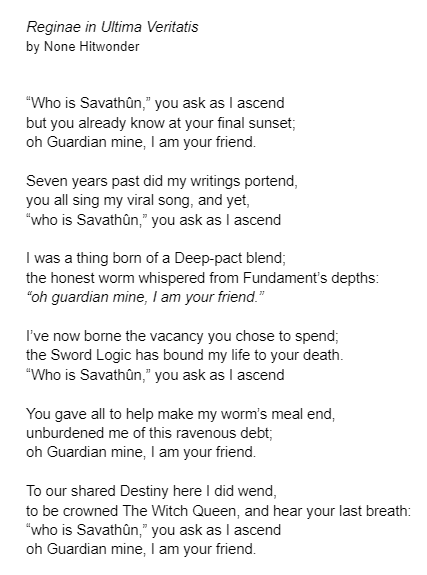a story doesn't just wear one hat, and other dumb metaphors
Posted by None Hitwonder in PersonalThere are so many rules and primers for how to tell good and effective stories, but for the sake of this writing I think we should acknowledge that "bad" stories, despite whatever flaws or structural issues, are still stories. With that in mind, the simple answer is that a story is a shared account of events that may or may not have happened.
I do, of course, recognize that some stories have more staying power than others, and it's hard to argue that there isn't a certain amount of craft to making a story that can effectively wield that power. I don't know how universal it is, but the famously transphobic JK Rowling, for example, took the principles from Joseph Campbell's monomyth and made a story that, for all its numerous flaws and outright failures, became one of the most popular in the world. I personally find Kurt Vonnegut, with his clarity of speech and his background in academics and journalism, to be a very "workmanlike" writer, and he's moved me to tears of laughter and sadness. Terry Pratchett's books play out like little movies in my head, and always have great parallels to our own world that make his satirical and often cartoonish fantasies more human and grounded than a lot of "harder" fiction. There are plenty of ways to successfully structure a story.
Personally, the stories that have stayed with me haven't necessarily always adhered to any specific structural style, but I connect to them in some way that makes me want to revisit them or otherwise keep them close. To me, stories can be a fun escape, but they're also reflective of ideas that I identify with, or otherwise contribute something that lets my mind play on its own. I'm not sure the Hitchhiker's Guide to the Galaxy really ends on solid ground as a single novella or as a series (maybe because the earlier books are essentially adapted radio-plays?), but it's probably one of my most-revisited and beloved books. Monty Python and the Holy Grail is widely regarded as one of the greatest comedy films of all time, and it just...ends. Here are the last 45 seconds of Monty Python and the Holy Grail
Someone once told me they didn't enjoy a movie because they didn't understand what the director was "trying to tell" them. Even when discounting the fact that films are made by tens or even hundreds of people beside the director, I found this assertion from them disturbing because to me, the audience is just as important as the author when it comes to story. You and I could read the same book and experience something completely different, and both our interpretations could be a complete departure from the author's intent, but ultimately something special and alchemical will have happened at that intersection of writer and reader, and that's the part I'm interested in: the connection.
Okay, so real quick: I don't know how many of you remember MIDI files, but before MP3s were a thing, if you wanted to listen to, say, "Bohemian Rhapsody," you downloaded what was essentially the size of a text file, and it sounded pretty synth-y and rooty-tooty. This is because MIDIs were essentially text files with instructions for software that interpreted and played it back with synth instruments that were included on your computer's sound card. No lyrics, no recorded anything, because a recorded song would have been way too big to fit on a floppy disk or send over what the kids in Degrassi: the Next Generation unironically referred to as the 'Net.
Yeah, that's what it sounded like. Welcome to the 90s. I listened to that entire thing just now on purpose.
It sounded more or less like "Bohemian Rhapsody," which is itself a kind of story that probably means a bunch of different things, depending on, for example, whether or not you've seen Wayne's World, but that's a story for another time.
On its own, a MIDI is a pretty complicated bit of writing, but without the right software to play that back, you get the following:
 "I'm not sure what the director of this MIDI is trying to tell me."
"I'm not sure what the director of this MIDI is trying to tell me."
Alright, that wasn't quick at all, was it.
Stories are things you can craft as mechanically as you like, or that you can imbue with your own life and personality, but your readers ultimately make the music play based on the instructions you leave them, and that's why stories are cool.


